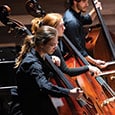
In a doctorate of musical arts (DMA) program with a dissertation requirement, one of the major hurdles to cross is the preliminary exam. The prelims have the misguided reputation of being mysterious and elusive, as DMA students often do not know what to expect. The following is a how-to guide to prepare for and conquer the preliminary exam.
What is the preliminary exam?
The preliminary exam, affectionately known as “the prelims,” is comprised of two parts: a written exam followed by an oral exam. Its purpose is to expand on the knowledge gained from coursework and help students prepare for their dissertation. Once students pass the prelims, they are officially a doctoral candidate with ABD (All But Dissertation) status.
When is it taken?
The prelims take place once students finish their coursework, which is typically after the second year of study. In my program at the University of Minnesota, DMA students are required to submit a GDP (Graduate Degree Plan) for approval by their advisor and the Director of Graduate Studies after the second semester of study. The GDP outlines the courses a student has taken and is planning to take throughout the degree. Once students fulfill these requirements, they are ready to schedule their exam. In my program, the prelims take place during the same semester students first register for thesis credits.
Selecting a Committee
In my program, the committee is made up of four professors: the primary advisor who is also the applied lessons professor, a professor from the music history/theory department, a professor from the student’s major field of study and a professor the student selects. Choose committee members who are familiar with your playing and academic work. Discuss the exam with them before it takes place. Their intent is not to make the exam something to fear.
What is the written exam like?
Each committee member submits an essay question to the student’s primary advisor for the written component of the exam. Once the questions are distributed, students have one week to complete the essays. Questions focus on a student’s performance and pedagogy specialties, research pursuits and dissertation topic. Sample questions from my written exam are listed below.
Question #1 Analysis (Provided with flute and bass line excerpt)
Consider the enclosed flute part and bass line. When and where might they have been written? What instruments might have played this piece?
A. What articulations and/or slurs might have been used in the flute part? If notes were articulated, what syllables might have been employed?
B. Discuss the original interpretations of the rhythm in this movement. How literal or free might they have been?
C. Based on your analysis of implied harmony and structure of these two voices, write your plan for dynamics throughout the flute part. Write about your basis for your decisions.
D. Discuss the role improvisation might play for each instrumentalist involved in performing this piece. Then choose four measures of the flute part and write out your ideas for ornamentation in these measures.
Question #2 Pedagogy
Part 1
A. Discuss how you might present the topic of sound production on the flute to a college freshman. Include such areas as embouchure, tongue and mouth position and breathing.
B. Discuss how you might present the possibilities for changing the pitch on the flute to a college freshman.
Part 2
This question is directed towards auditioning undergraduate and graduate music majors at a college, university or conservatory. Select and provide a review of excerpts you would use in auditioning undergraduate and graduate flutists into a comprehensive ensemble program. The goal of these auditions is to help prepare students for auditioning beyond college and provide sufficient evidence that will lead toward positioning students into a wind ensemble and symphony orchestra pool of players, similar to your experience here at the University of Minnesota. Additionally, these auditions must serve as a vehicle for assigning parts within a section and use of piccolo. Include the musical excerpts you would use and your rationale for using them. Your response should be double spaced and minimum 8 pages in length.
Question #3 Baroque Rhythmic Alteration
Discuss rhythmic alteration in music of the Baroque Era, including over-dotting, underdotting, notes inégales, two-against-three notation, and rubato. For each category, give at least one specific example, write out in modern notation how the rhythm should (or might) be executed, and provide the historical justification for the rhythmic alteration you propose.
Question #4 Learning Techniques
Give a minimum of three non-instrumental techniques or processes that you would use in practicing learning a piece of music. Talk about each technique and how it relates to the music or instrument. Also, how would you choose to use to a particular non-instrumental technique for a particular need? (Phrasing, breathing, rhythm etc.).
Completing the Written Exam
For me, the most challenging aspect of the written exam was completing the essays efficiently and well in a short amount of time while raising a puppy, training for a marathon and balancing work, teaching and performances. An approach that worked well was to create an outline for each question and prioritize questions based on the amount of time they would require to complete. The music history question took the most time because of the research it required. I gathered sources and started my research while I began to flesh out the outlines for other questions. When I begin writing, I never start at the beginning. Instead, I write the body of the essay first and the introduction and conclusion last. I formulate my thesis statement once I conduct my research and have the evidence to support my argument.
Preparing for the Oral Exam
The oral exam is scheduled once you receive notice that you have passed the written exam. At the University of Minnesota, it takes place no later than two weeks after the completion of the written exam. The oral exam is simply a scholarly discussion on the topics of your written exam. The committee members may choose to ask follow-up questions, ask you to analyze the score of a relative work, or ask entirely new questions derived from the original topics. Be prepared to discuss your dissertation topic and research methods. For example, I was asked to describe and name examples of composers and works from the Rococo period, name compositional techniques used in Varese’s Density 21.5, name the principal flutists of the major symphony orchestras in the United States, name recordings I would suggest my students listen to in order to prepare for an ensemble audition and analyze a section of Bach’s Brandenburg Concerto No. 3.
After you pass both components of the preliminary exam, you are officially ready to start writing your dissertation and well on your way to graduating with a Doctorate of Musical Arts degree.





